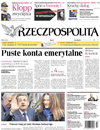The runoff election which pits Socialist François Hollande and conservative incumbent Nicolas Sarkozy was long anticipated by opinion polls, which, in recent days placed Hollande as the frontrunner. The high score of the far-right National Front candidate, Marine Le Pen, however, came as a surprise. With nearly 20% of the vote, Le Pen will weigh on Sarkozy's campaign.
For the Financial Times Deutschland, Nicolas Sarkozy's second place score is a "humiliation" which shows the "brutal rejection" to which he is subjected. The German daily says that the first round is "not just a result, it is a verdict against a president unable to accomplish the necessary reforms". Convinced that the French want to get rid of Sarkozy at all cost, the FTD notes that François Hollande could have just the pragmatic skills essential to getting out of the crisis -
The results of this first round brings a major opportunity and, at the same time, a greater risk. Paradoxically, this opportunity is hidden behind Hollande's bland appearance and his un-dynamic personality. If there is no miracle in the next two weeks, France will get a boring president to replace someone who is constantly self-promoting. But with his reserve and his lack of determination, Hollande may be more capable than his predecessor at launching a pragmatic policy of necessary reforms to lift the country out of the debt crisis and of its economic misery.
Receive the best of European journalism straight to your inbox every Thursday
In Warsaw, Marek Magierowski, leader writer for Polish daily Rzeczpospolita, says that "Nicholas Sarkozy is tottering". The incumbent, he writes -

... will have trouble rallying supporters of Marine Le Pen, most of whom will probably abstain in two weeks' time. If Sarkozy wants to dream of re-election he must put everything at stake and move further to the right. Considerably more to the right. If he wants to win, he must become a lepenist, if only for a while.
Spanish daily El País, for its part, says that the effects of the French vote go beyond the country's borders. According to the paper -
... all of Europe is concerned by this election which opposes two different conceptions of integration at the continental level. Although in the final stages, Sarkozy's position was closer to Hollande's regarding the need to develop growth policies and not only asphyxiating austerity measures, they are separated by other issues such as the control of immigration in the European Union. It would be paradoxical if [conservative Spanish Prime Minister Mariano] Rajoy's main ally within the EU ended up being a Socialist in the Elysée [the French presidential mansion]. Even if only for appearances as was the case with Sarkozy and [former Spanish PM, Socialist José Luis] Zapatero.
Greek daily To Vima sees the French vote as "a lesson for Germany". "Nicolas Sarkozy's defeat is not just his defeat, but also that of German policies," the paper says. "Policies that he faithfully supported ". This first major election since the signing of the EU Budget Pact sends two messages, To Vima explains -

First, that Germany's role as leader in Europe is the central theme that divides the French electorate. Then that the French people are feeling the consequences of the policies imposed on Europe by Germany, even if it is less hard hit [...] If a Sarkozy defeat is confirmed by the runoff and if France changes president, that does not mean that the new head of state will actually react to Germany's European dictates. Particularly because the financial markets will soon threaten France with high interest rates if it does not adapt to German policies [...] Europe is thus turning against Germany. Because it is possible to scare governments but not the people. That is why, whether or not François Hollande is elected, it is the beginning of the end for German dictates.
Was this article useful? If so we are delighted!
It is freely available because we believe that the right to free and independent information is essential for democracy. But this right is not guaranteed forever, and independence comes at a cost. We need your support in order to continue publishing independent, multilingual news for all Europeans.
Discover our subscription offers and their exclusive benefits and become a member of our community now!












